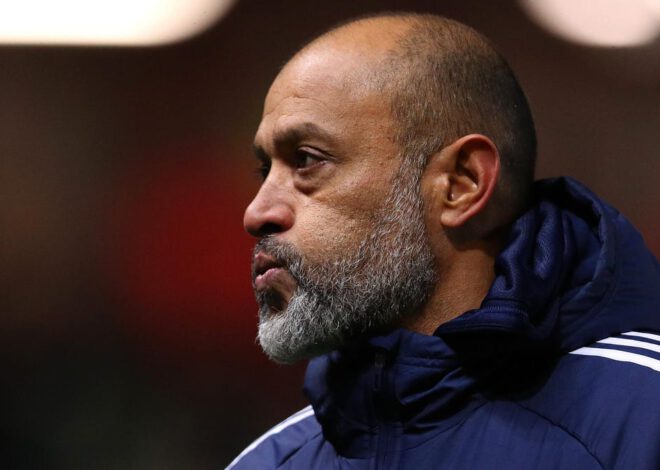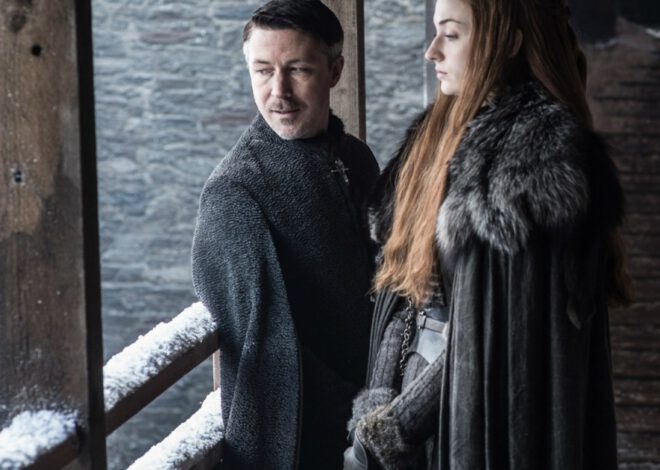
10 best Martin Scorsese movies, ranked
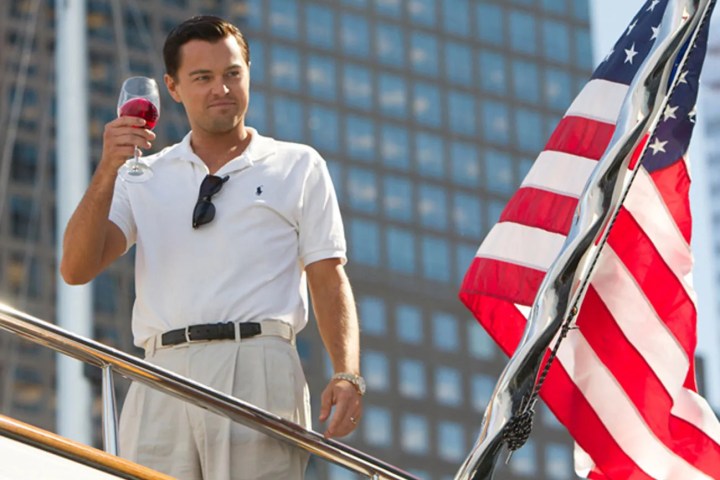 Paramount Pictures
Paramount Pictures
When looking at the career of an influential filmmaker like Martin Scorsese, it’s hard not to be overwhelmed by the sheer enormity of it. Over the course of his nearly six-decade career, Scorsese has made north of 20 scripted feature films and numerous documentaries — nearly all of which are considered classics now by cinephiles. In the weeks leading up to the release of his latest film, Killers of the Flower Moon, the quality of Scorsese’s filmography has felt particularly apparent. No other filmmaker of the past 50 years has made as many indelible classics — masterpieces that strike the perfect balance between personal and universal that has always been at the heart of great cinema.
To try and rank any of his films feels like a foolish endeavor, if only because many of them seem to grow in both depth and complexity based on the more time one spends with them. Nonetheless, in honor of Scorsese’s latest directorial effort, we’ve decided to rank his 10 best films in as definitive a fashion as we can.
10. The Departed (2006)
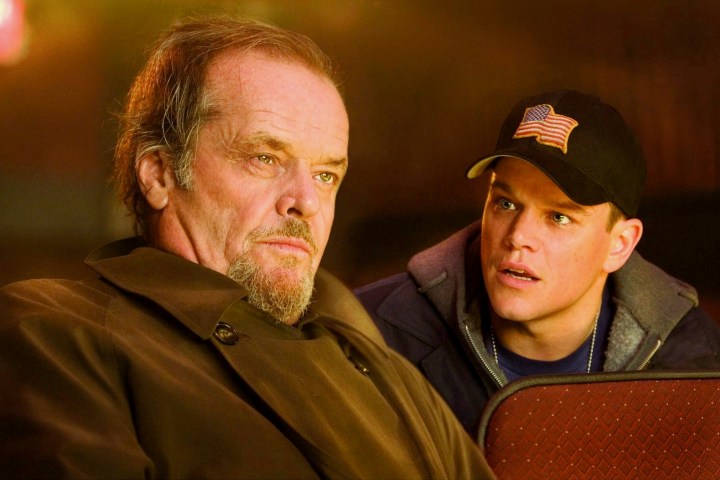 Warner Bros. Pictures
Warner Bros. Pictures
The Departed will forever be known as the film that finally won Martin Scorsese his Oscar, which is a bit of an odd reputation for a movie that is so over-the-top, acidic, violent, and monstrously funny. A loose remake of the 2002 Hong Kong thriller Infernal Affairs, The Departed is Scorsese at his loosest, most fun, and — hilariously enough — lighthearted.
One never gets the sense at any point throughout the film that the director is taking any of it too seriously, which just makes the sheer effectiveness of The Departed (it’s one of Scorsese’s most purely entertaining movies) and its double-agent plot all the more impressive.
9. Casino (1995)
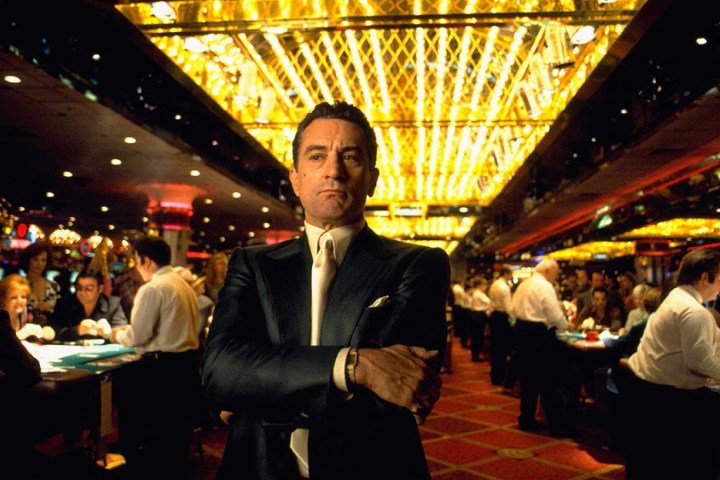 Universal Pictures
Universal Pictures
If anyone else had made Casino, it’d likely be considered their best film. For Martin Scorsese, though, it ranks undeniably high as one of his many minor masterpieces. Coming five years after 1990’s Goodfellas, the film is bigger, longer, and more gobsmackingly gorgeous than its predecessor, but not quite as precise or hard-hitting. When it was released, everyone seemed to agree that it was an attractive, but ultimately lesser spiritual sequel to Goodfellas, and that general consensus has continued to mar its reputation.
Thirty years later, however, Casino stands out not because of what it has in common with Goodfellas, but because of what separates it from that film — namely, its glitzy Vegas setting, uncharacteristically romantic first half, and a performance from Sharon Stone that is among the very best that Scorsese has ever captured onscreen.
8. Killers of the Flower Moon (2023)
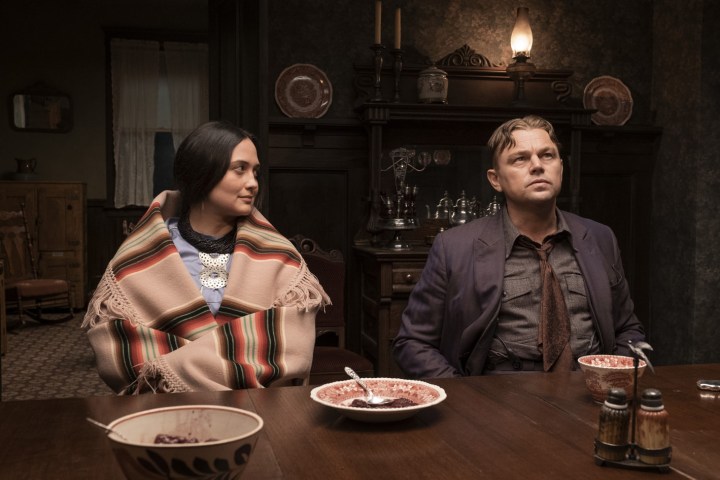 Paramount Pictures/Apple Original Films
Paramount Pictures/Apple Original Films
Martin Scorsese’s newest film is also one of his most ambitious, grand, and haunting pieces of work to date. Based on David Grann’s 2017 novel of the same name, Killers of the Flower Moon is an expensive, 206-minute epic about a series of vicious murders that were meticulously organized and carried out against the oil-rich people of the Osage Nation in 1920s Oklahoma.
With its somber tone, unflinching depiction of violence, steady gaze, and mournful pace, the film lays bare the painful truths of not only America’s past and present sins, but also Scorsese’s own complicated relationship with the country that he calls home. It may be too soon to call it a masterpiece, but time will likely be just as kind to Killers of the Flower Moon as it’s been to all of Scorsese’s films.
7. The Age of Innocence (1993)
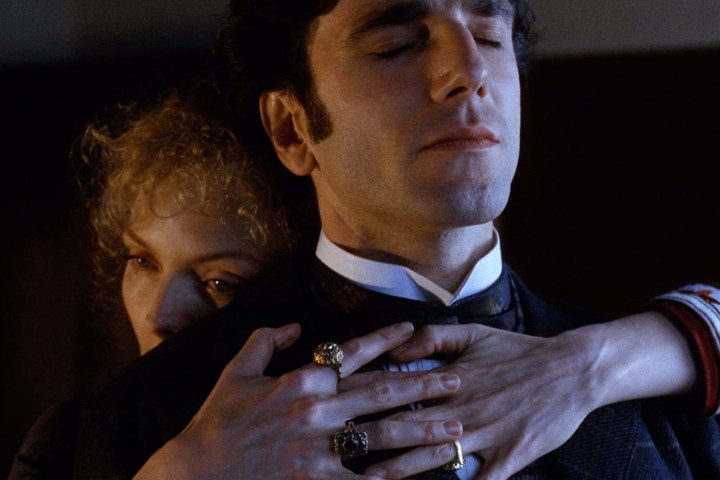 Columbia Pictures
Columbia Pictures
The most romantic film Martin Scorsese has ever made is also one of his most painful, delicate, and beautiful. A left-turn follow-up to Goodfellas, 1993’s The Age of Innocence is an Edith Wharton adaptation that sees Scorsese travel back in time to a version of New York City he had rarely explored before. As much a tragedy of manners as it is, like Goodfellas, a portrait of a very specific American subculture, The Age of Innocence was long considered one of Scorsese’s most underrated films. Its recent critical renaissance has made it hard to categorize it as such anymore, but the praise it has received is well-deserved.
Boasting two all-time great performances from Michelle Pfeiffer and Daniel Day-Lewis, The Age of Innocence is a stunningly cinematic love story — one so full of yearning and heartache that it feels at certain moments like it might just burst. It never does, of course, which is where its brilliance truly lies.
6. The King of Comedy (1982)
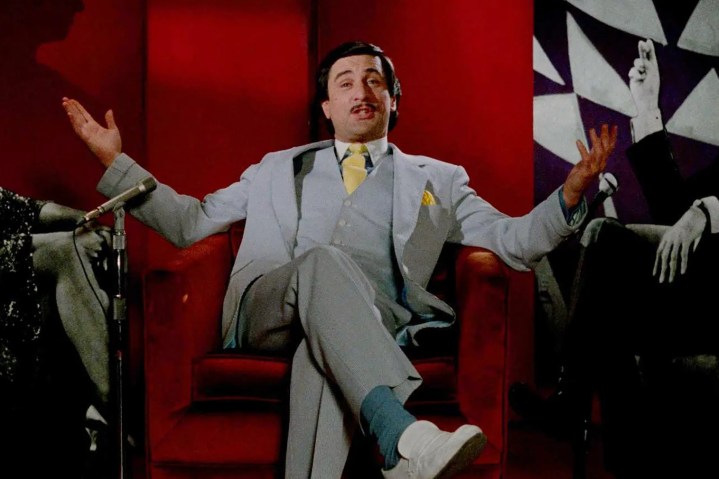 20th Century Fox
20th Century Fox
A satirical black comedy that only seems to grow wiser and more prophetic with each passing year, The King of Comedy was a box office flop when it was released — a fact that Martin Scorsese himself seemingly still hasn’t gotten over. He shouldn’t, either, given how undeniably impressive its craft is and as exacting its criticisms of America’s ever-growing celebrity culture are.
Heavily ripped off by 2019’s Joker, The King of Comedy is an odd cocktail of different, seemingly contradictory tones and performances, and yet it goes down far smoother than it arguably should. Only a filmmaker as talented as Scorsese could have made a film that is so darkly perceptive so simultaneously watchable, and only someone as openly obsessive as him could have made its mix of comedy, violence, and contempt work so well.
5. The Irishman (2019)
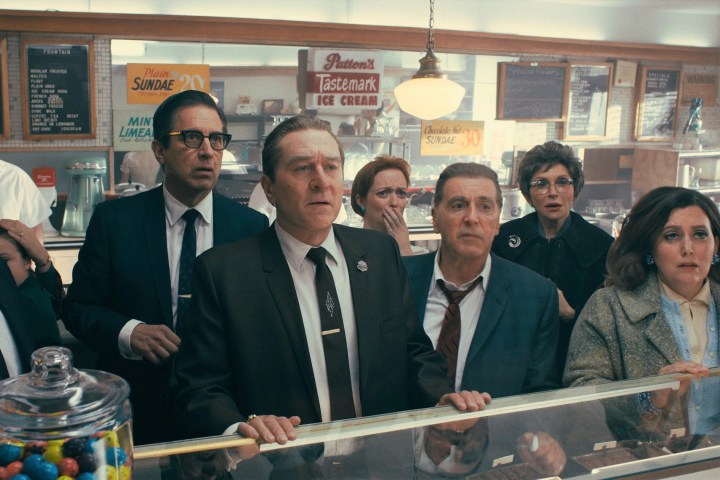 Netflix
Netflix
The Irishman is the culmination of Martin Scorsese’s lifelong obsession with organized crime and the mob. Starring one of the greatest trios that’s ever been assembled on-screen in Robert De Niro, Al Pacino, and Joe Pesci, the film follows De Niro’s Frank as he slowly, but surely erodes the only worthwhile aspects of his life in order to keep his place within the mob. It’s just as flashy and violent as any of Scorsese’s other crime movies, but what makes The Irishman resonate so deeply is its final third, which goes further than Mean Streets, Casino, and Goodfellas by showing where a life without loyalty, honor, or love ultimately leads.
There’s nothing as merciless as time, and by making his characters in The Irishman fully reckon with that fact, Scorsese manages to make some of his most profound observations to date about the ways in which selfishness and shortsightedness can subtract from the sum total of one’s life.
4. Raging Bull (1980)
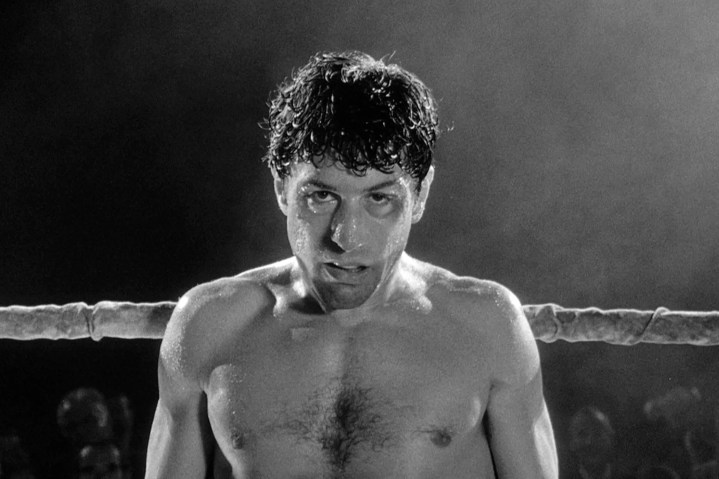 United Artists
United Artists
One of the most engaging, raw depictions of male fragility that’s ever been rendered on-screen, Raging Bull is as bare an example of Martin Scorsese’s immense talent as the filmmaker has ever made. Starring Robert De Niro as real-life boxer Jake LaMotta, Raging Bull has long been known for the dramatic physical transformation achieved by its lead star, who won his second Oscar for his performance in the film.
What makes the movie such a transcendent piece of art, though, is how beautifully Scorsese’s own style, which is alternately at its most plain and poetic throughout Raging Bull, both highlights and matches the intensity of De Niro’s seismic performance. The result is one of the most haunting portraits of a psychologically wounded man that you’ll ever see — and yet just one of several masterpieces that De Niro and Scorsese have made together.
3. The Wolf of Wall Street (2013)
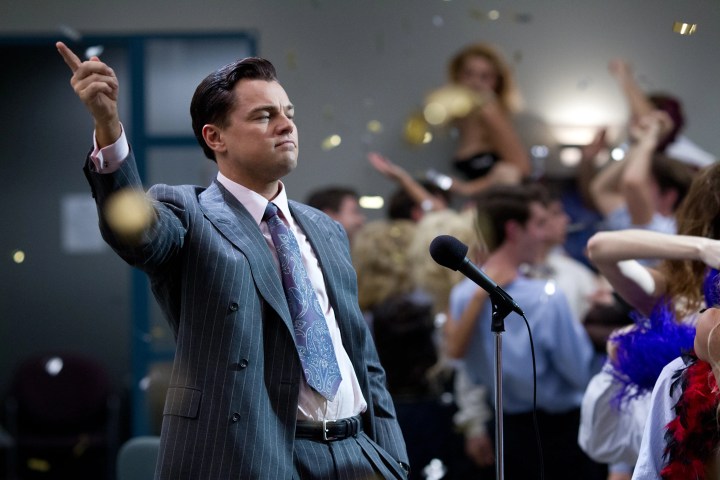 Paramount Pictures
Paramount Pictures
The Wolf of Wall Street is the most contemptuous film that Martin Scorsese has ever made — and also his funniest. A pitch-black comedy about infamous stockbroker and financial criminal Jordan Belfort, the 2013 film is a three-hour takedown of American greed that lampoons its subjects by fully, nakedly presenting the absurd excessiveness of their lives. It’s the closest Scorsese has ever come to remaking Fellini’s La Dolce Vita, but it finds its own note of brilliance by asserting that real criminals — financial brokers like Leonardo DiCaprio’s Belfort most of all — feel no sense of shame or internal conflict over the unnecessary indulgences of their lives.
The shamelessness of The Wolf of Wall Street’s characters only makes the collective emptiness of its many lavish adventures all the more devastating, and it’s a testament to Scorsese’s talent that he’s able to make the film as simultaneously fun and chilling as he does.
2. Goodfellas (1990)
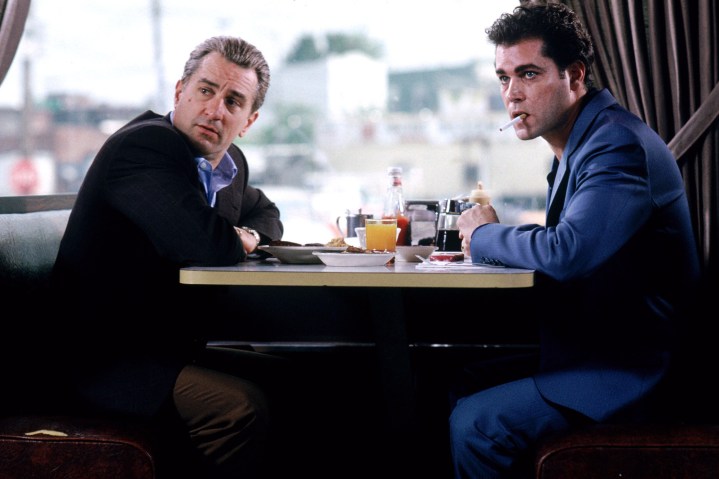 Warner Bros. Pictures
Warner Bros. Pictures
Goodfellas is the most widely beloved film that Martin Scorsese has ever made, and for good reason. Based on the life of former mobster Henry Hill, the 1990 classic is an exhilarating, anxiety-inducing portrait of the New York mafia that finds Scorsese operating at the peak of his filmmaking powers. Anchored by four iconic performances from Joe Pesci, Robert De Niro, Ray Liotta, and Lorraine Bracco, Goodfellas represents the perfect synthesis of subject matter and form.
It features the best Steadicam shots, needle drops, and coked-up, whip-fast edits of Scorsese’s career, and uses the prolonged montage structure of the first half of Francois Truffaut’s Jules and Jim to create a portrait of organized crime that is rich in its complexity and detail and expansive in its scope. It’s the rare film that is more than just the sum of its parts. There’s an ineffable quality to Goodfellas that’ll leave you coming back to it again and again for more.
1. Taxi Driver (1976)
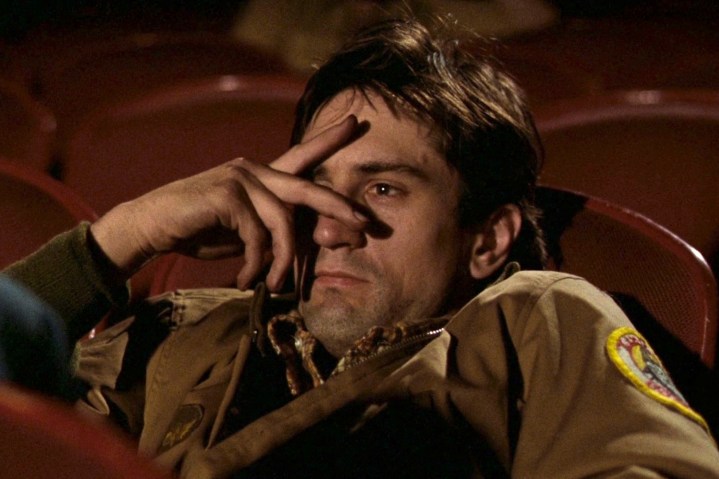 Columbia Pictures
Columbia Pictures
One could easily swap the top two films on this list. They are separated not by levels of greatness, but only by small degrees. However, in the 56 years that he’s been directing movies, Martin Scorsese has never made a film more flawlessly composed and constructed than Taxi Driver. An exploration of urban loneliness and male toxicity that has yet to be matched, this 1976 classic is, perhaps, the single greatest character study in cinema history. No other film quite as seamlessly immerses you in the mind of its lead, and few have ever presented the horrors of misplaced bitterness and hatred quite as effectively.
In a film that very easily could have gone wrong, Scorsese makes not a single wrong decision throughout Taxi Driver. From each of its immaculately grimy frames to Bernard Herrmann’s breathtaking score and Robert De Niro’s titanic lead performance as Travis Bickle, it’s a movie made of a million perfect decisions — an opera that never fails to hit the right note.

